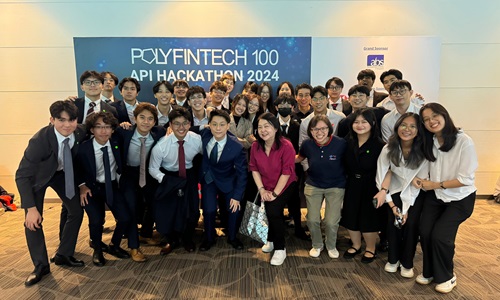Why BF?
- Build a strong foundation in finance coupled with the latest tech skills
- Gain digital skills and sustainability knowledge to prepare you for in-demand careers in banks, financial institutions and FinTech start-ups
- Drive financial innovation with industry-relevant skills honed through integrated projects and real-world business solutioning
- Customise your learning: Choose a six-month local/overseas internship + Business Electives NEW! in emerging areas; or the one-year JobReady Programme with renowned companies
About BF
What do banks have to do with fighting climate change? More than you think. In the Diploma in Banking & Finance (BF), you will discover how finance powers green projects and shapes the future.
Build a strong foundation in finance and business, as you gain insights into how banks operate and the role they play in the economy. You will also dive into key areas such as Environmental, Social and Governance (ESG) standards and green finance – a growing field where finance drives positive change through sustainable investments and climate-focused initiatives.
To round things off, you will explore business law and how companies manage risk and stay compliant in today’s fast-evolving financial landscape.
Get hands-on with the latest financial tools and trading platforms used by professionals. You will also explore emerging technologies such as generative AI, Application Programming Interfaces (API), Electronic Know Your Customer (e-KYC) and Insurtech – equipping you with digital skills that give you an edge!
With modules co-designed by industry leaders from companies like UOB, DBS and PhillipCapital, the BF curriculum is closely aligned with real-world practices. Through interactions with industry practitioners, you will stay on top of industry developments.
Beyond the classroom, you will participate in events like the Pan-Poly FinTech Hackathon and CGSI ASEAN Investment Challenge, where you will tackle real business challenges that put your skills to the test.
Choose how and what you learn in your final year! Opt for a six-month internship with leading local/overseas banks or FinTech companies, or the one-year JobReady Programme for extended workplace immersion. Our reputable partners include DBS, OCBC, UOB,
MAS, SGX, GIC, HSBC, Julius Baer and SeaMoney.
If you opt for the six-month internship, you will also get to take two electives under the new Business Electives Programme and an industry project. Designed to supercharge your learning, the Business Electives Programme focuses on the
latest strategic growth areas in business:
- Business Psychology
- AI & Digital Transformation
- Business Sustainability

Highlights
Close to 100 BF students participated in the annual PolyFinTech 100 API Hackathon 2024, a competition meant to nurture FinTech talents. A group of BF students clinched the winning title in the Decentralised Finance and RegTech categories for their innovative ideas.
Further Studies
The BF diploma is recognised by all local and many overseas universities. In Australia and the United Kingdom, you may receive up to a one-year exemption, allowing you to complete your degree earlier. Professional bodies like the Institute of Chartered Accountants in England and Wales (ICAEW) and the Institute of Banking & Finance (IBF) also recognise our diploma.
Additionally, you will be exempted from one module of the Capital Markets & Financial Advisory Services (CMFAS) examinations. In partnership with the Financial Planning Association of Singapore (FPAS), all BF students graduate with the Associate Financial Planner (AFPCM) certification, giving you a head start on the path to becoming a Certified Financial Planner (CFP®).
Careers
As a BF graduate, you will have strong career opportunities in fields such as FinTech, corporate finance, financial planning, investment and wealth management, ESG, sustainable finance, KYC, risk management, compliance, operations management, credit as well as digital marketing.
You can pursue roles such as:
- Banking Sales Executive
- Banking Services Executive
- Credit Analyst
- Compliance Executive
- Customer Service Executive
- ESG Product Specialist
- Financial Advisor
- KYC Analyst
- Personal Wealth Executive
- Risk Analyst
- Sustainable Finance Analyst
Entry Requirements
AGGREGATE TYPE ELR2B2-B
To be eligible for consideration, candidates must have the following GCE ‘O’ Level examination (or equivalent) results.
| Subject | 'O' Level Grade |
|---|---|
| English Language | 1-6 |
| Additional Mathematics/Mathematics | 1-6 |
| Any one of the 2nd group of Relevant Subjects for the ELR2B2-B Aggregate Type | 1-6 |
Applicants must also fulfil the aggregate computation requirements for the ELR2B2-B Aggregate Type ( English Language, 2 relevant subjects and 2 other best subjects) listed at www.np.edu.sg/docs/ELR2B2.pdf .
For students with other qualifications, please refer to the NP website for the entry requirements and admissions exercise period.
What You Will Learn
This module equips students with the essential skills to extract meaningful insights from data. Through a blend of theoretical concepts and practical applications using data visualisation tools, students will learn to collect, clean, analyse, and visualise data to inform decision-making. The module emphasizes critical thinking, problem-solving, and the ability to communicate findings effectively.
Economics (3 Credit Units)
This module provides students with an understanding of the core principles of microeconomics and macroeconomics with an application of these concepts in real-world business scenarios. Topics include Demand and Supply, Price Elasticity, Market Structure, Gross Domestic Product, Unemployment, Inflation, Fiscal and Monetary policy.
Global Business (3 Credit Units)
This module provides students with fundamental knowledge of how the external business environment, consisting of country and industry level factors, affects the overall strategy, organisational structure and various internal functions of international businesses. Students will also discuss how contemporary world affairs, such as the impact of globalisation, terrorism, pandemics, emergence of economic powers in Asia and digitalisation present both opportunities and challenges to international businesses.
Makings of a Business (4 Credit Units)
Students will gain hands-on and real-world experience as they actively learn to integrate and apply knowledge and skills acquired in various modules to manage different types of businesses through game simulation. They will gain understanding of the inter-dependence of the different business functions, and to make data-driven decisions to address day-to-day operations of a business. They will also develop critical thinking and complex problem-solving skills as they analyse performance data and evaluate decisions to improve overall company performance.
Statistical Applications for Business (4 Credit Units)
This module introduces students to basic statistical concepts, tools, models, and the introductory use of generative AI. Students will learn how to organise and analyse data, as well as interpret results for decision-making in the business world. Students will apply and reinforce their learnings through data presentation, use of AI, performing descriptive analysis and data generated from the Business Simulated Game.
Health & Wellness^(1 Credit Unit)
This is a Level 1 Core module for all Year 1 students. The module will introduce students to the importance of maintaining both physical and mental health through the knowledge and monitoring of health indicators, and application through appropriate exercises. The aim of the module is to empower students with basic knowledge and skills to be independent and responsible in maintaining overall personal health.
Innovation Made Possible^ (3 Credit Units)
English Language Express* (Credit Units - NA)
English Language Express aims to give you a better grounding in the English Language and to strengthen the written and oral communications skills that you will need in your academic and professional careers. You will be engaged in writing, reading, listening and speaking activities that will develop your ability to speak and write grammatically, coherently and clearly. You will also hone your reading and listening comprehension skills.
* This module is only offered to students who are weaker in the English Language.
^ Critical Core modules account for 10 credit units of the diploma curriculum. They include modules in innovation and world issues, as well as an interdisciplinary project. By bringing students from diverse diplomas together, the interdisciplinary project fosters collaboration to explore and propose solutions for real-world problems. NP aims to develop students to be agile and self-directed learners, ready for the future workplace.
This module equips students with essential written and oral communication skills for professional success. Students will learn to craft clear and logical business messages, deliver impactful elevator pitches, and present persuasive business ideas using storytelling and persuasion principles. They will also create a professional digital profile to enhance their online presence, building their confidence to engage and network with a diverse audience.
Career & Professional Preparation (2 Credit Units)
This module supports students in their journey of self-discovery, character-building, NP values-inculcation, development of education and career goals via experiential activities and guided reflections with CPP coaches. To prepare them for their career and the future, students will also deepen their knowledge of the respective diploma curriculum and industries through learning journeys, mentorship and opportunities for interactions with alumni and industry practitioners. The module will incorporate a more comprehensive feedback and reflective approach from self, peers, tutors and the industry mentor to support students’ holistic growth and development.
Digital Experience Design (3 Credit Units)
This module equips students with practical skills in user-centred design for business digital applications, covering key design principles, interface and experience evaluation across platforms, and the use of AI-powered software tools and highlighted through examples like AI-enabled solutions.
Finance & Accounting for Business (3 Credit Units)
The module imparts basic accounting and finance knowledge to students, in areas such as accounting equations, accounting principles, financial statements, ratio analysis, cash budgeting, short-term financing strategies, time value of money and capital investment analysis. Students will demonstrate their understanding by using financial software to interpret financial accounting information for decision-making in business environments when working on integrated project scenarios.
Kickstart a Business (4 Credit Units)
The module is designed for students to integrate and apply learning from the different modules to address real-world challenges provided by industry partners. Using the Lean methodology, students will build a Lean Canvas Model to develop and showcase a minimum viable product to address challenges and evaluate opportunities. They will learn about resource optimisation and value creation for businesses.
Marketing (3 Credit Units)
The module provides students with a strong foundation in marketing, equipping them with the skills necessary to develop effective marketing plans and strategies for the digital landscape. Students will gain a comprehensive understanding of fundamental marketing concepts, with a specific focus on their application in the digital realm.
This module aims to equip students with the fundamentals of Corporate Finance. Students will acquire knowledge on the workings of a firm including sources and cost of capital, capital budgeting, capital structure, and business valuation techniques. Corporate governance and corporate actions undertaken by a firm will also be covered.
Financial Planning (5 Credit Units)
This module provides students a coherent understanding of personal financial planning with the aim to help students to achieve financial freedom. This module aims to equip students with the understanding and technicalities of financial planning and to prepare them for a career in providing financial advisory services. Students will be engaged in service learning and tools to deepen their understanding in financial planning.
Financial Markets & Instruments (3 Credit Units)
This module examines the structure and functions of a modern financial system. Students will learn about the key roles played by the financial institutions, central bank and the stock exchange in the financial markets, and how the major types of investment instruments, such as stocks, bonds and foreign exchange transactions are being utilised to facilitate the flow of funds including covering current issues in the financial sector such as Environmental, Social and Governance (ESG).
Fintech & Digital Banking (5 Credit Units)
This module provides an overview of the emerging technologies and current trends in fintech (financial technologies) like Sustainable Finance and InsurTech that drive digital banks. It covers the characteristics of open banking, including the concepts of open APIs (Application Programming Interfaces). Students will gain foundational skills in basic Python programming and experiment on some of the emerging technologies like Gen AI, Chatbot, Robotic Process Automation (RPA) and Blockchain - Distributed Finance using case studies and solving industry problems.
Professional Branding & Networking (4 Credit Units)
This module enhances students' communication skills by focusing on professional branding and networking. Students will learn to craft impactful job application letters and resumes, develop effective job interview techniques through online lessons and role-plays, and strengthen their professional digital profiles. They will also participate in networking simulations across diverse business settings, equipping them with the confidence and skills needed for career success.
This module provides students with foundational legal concepts, including the Singapore legal system and laws of contract and tort, along with emerging legal trends. Students will explore the legal framework governing financial institutions, financial and securities laws, regulatory tools, consumer protection, and wealth and trust management, and examine the role of the Financial Action Task Force (FATF) and the Basel Committee on Banking Supervision (BCBS), with an emphasis on their relevance to the banking and finance sector.
Corporate & Institutional Banking (4 Credit Units)
This module offers an overview of institutional banking solutions within the capital markets. It equips students with practical knowledge of key areas such as commercial lending, transaction management, post-trade financing, collateral management, and corporate actions. Additionally, the module explores green loan principles and their pivotal role in promoting sustainability and Environmental, Social, and Governance (ESG) standards. Students will also gain insights into essential credit evaluation techniques for credit risk assessment, straight-through processing (STP), business continuity planning (BCP), and adherence to regulatory guidelines.
Investments (4 Credit Units)
Students will learn about the risk and return characteristics of major asset classes such as stocks, bonds, and options, and the valuation techniques to value these financial instruments. They will also be equipped with the knowledge to use industry tools and trading platforms to make sound investment decisions. Current trends such as the Principles of Responsible Investments (PRI) will also be covered in the module.
Risk & Compliance (3 Credit Units)
This module provides students with an overview of integrated risk management and financial crime management in the financial institutions. Students will acquire knowledge on both financial risk management such as market risk and credit risk, and operational risk management where known case studies and real-life applications are introduced. The module will also cover business continuity management, regulatory instruments compliance, cross-border financial crimes mitigation, technology risk management and other emerging issues that are critical to the development of a safe and sound financial institution.
Wealth Management (3 Credit Units)
This module provides students with a broad overview of the Wealth Management industry. Students will gain knowledge of the conventional components of a High Net Worth Individual’s investment portfolio including equities, bonds, real estate and other alternative investment such as hedge funds, private equity and structured products. They will learn about portfolio management, performance evaluation and be exposed to the client expectations of a relationship manager and the core concepts of succession planning. Students will use Gen AI to design portfolios for clients under various scenarios.
World Issues: A Singapore Perspective^ (2 Credit Units)
^ Critical Core modules account for 10 credit units of the diploma curriculum. They include modules in innovation and world issues, as well as an interdisciplinary project. By bringing students from diverse diplomas together, the interdisciplinary project fosters collaboration to explore and propose solutions for real-world problems. NP aims to develop students to be agile and self-directed learners, ready for the future workplace.
Year 3
Students can choose from the following options in Year 3:
Capstone Project
The Capstone Module provides opportunities for students to integrate and apply their acquired skills and knowledge in banking and finance, to develop and execute industry-based projects. The Capstone Module may involve research, analysis, problem-solving and creative work. It should demonstrate the student's ability to think critically, communicate effectively, and work independently. It will prepare the students for the world of work.
Electives 1 & 2 (4 Credit Units each)
Students can choose any 2 Electives from the Business Electives Programme.
Project ID: Connecting the Dots^ (4 Credit Units)
^ Critical Core modules account for 10 credit units of the diploma curriculum. They include modules in innovation and world issues, as well as an interdisciplinary project. By bringing students from diverse diplomas together, the interdisciplinary project fosters collaboration to explore and propose solutions for real-world problems. NP aims to develop students to be agile and self-directed learners, ready for the future workplace.
Students will acquire work experience through supervised work immersion and on-the-job training of six months with financial institutions, government-related agencies, multinationals and other corporations. Students learn beyond the classroom boundaries with professional practitioners as their mentors. They will be provided with relevant training and equipped with knowledge and skills to enable them to perform effectively in their workplace attachments.
One-Year JobReady Programme
This industry attachment provides authentic learning experiences in a real-world, and self-driven learning environment for students to apply their competencies to practical work issues. Students will acquire work experience through supervised work immersion and on-the-job training with financial institutions, government-related agencies, fintech start-ups and other corporations with professional practitioners as their mentors.
Industry Attachment 2 (18 Credit Units)
This industry attachment provides students with an additional opportunity for on-the-job training. Besides gaining skills and knowledge through service-learning and first-hand
experience in the financial services sector, students can build up their network and portfolio. They will be coached by a mentor in the company throughout the period of attachment.
Project ID: Connecting the Dots^ (4
Credit Units)
^ Critical Core modules account for 10 credit units of the diploma curriculum. They include modules in innovation and world issues, as well as an interdisciplinary project. By bringing students from diverse diplomas together,
the interdisciplinary project fosters collaboration to explore and propose solutions for real-world problems. NP aims to develop students to be agile and self-directed learners, ready for the future workplace.
Business Electives Programme
This module explores how consumers think, feel, and act in digital environments. Students will analyse digital behaviour, assess market sentiment, and design behaviourally informed experiences. Using nudging techniques, behavioural analytics, and psychological insights, they will design customer-focused experiences that subtly guide decisions, boost engagement, drive conversions, and optimise digital interactions. Ethical considerations in influencing consumer behaviour will also be discussed.
Behavioural Insights for Strategic Communications
This module explores developing effective communication strategies that build trust, influence behaviour, and resonate across diverse cultural contexts. Students will learn to create strategic communication approaches, apply trust-building techniques, and craft behavioural content that drives engagement. Through a cross-cultural lens, they will analyse how communication styles affect perception, decision-making, and relationships in business and digital environments.
Behavioural Insights for Workplace Experiences
This module explores how UX psychology, nudging, and design principles create better workplace experiences. Students will learn to design employee experiences, apply psychology to workplace interactions, and use behavioural nudges to improve productivity and well-being. They will also measure experience initiatives and track innovation trends. By integrating workplace psychology, UX, and behavioural insights, students will develop strategies to boost employee engagement and organisational effectiveness.
This module blends theory and practice to equip students with predictive analytics and data visualisation skills. They will learn to analyse structured and unstructured data, spot trends, and apply machine learning and statistical techniques to solve business problems. Emphasising data-driven decision-making, the module covers advanced visualisations and storytelling to communicate insights effectively. Through real-world projects, students will use open-source tools and basic coding to develop data-driven strategies for industry challenges.
AI in Business
This module introduces students to the transformative role of AI in business, covering key technologies such as machine learning, computer vision, NLP, and robotics. Students will apply generative AI and automation tools, including large language models and AI agents. The module showcases applications of AI across industries while highlighting the critical role of data quality, ethics, and responsible use. Learning culminates in a hands-on project, equipping students to contribute to AI initiatives in business effectively.
Digital Innovation & Transformation
This module examines how digital innovation transforms businesses, equipping students with the skills to identify opportunities, develop strategies, and implement transformative solutions. They will assess business environments, leverage emerging technologies, and apply strategic thinking to drive innovation. Students will conceptualise, prototype, and deliver digital solutions through a hands-on project while mastering stakeholder collaboration, project management, and change implementation. By the end of the module, they will be prepared to lead and support digital transformation initiatives for sustainable growth and competitive advantage.
This module explores innovative and sustainable approaches businesses can adopt to drive positive environmental and economic impact. Learners will examine how organisations collaborate with stakeholders to foster responsible practices, optimise resource use, and transition toward long-term sustainability. Through case studies and real-world applications, students will develop critical thinking skills and adaptability to emerging global trends, ensuring their ability to implement forward-looking strategies in a rapidly evolving business landscape.
Carbon Management
This module provides an overview of carbon management in business, covering key concepts, frameworks, and industry practices related to sustainability. It examines the role of policies, reporting systems, and strategies for managing environmental impact. Students will explore approaches to addressing carbon-related challenges in various business contexts through discussions and applied learning.
Governance & Sustainability Reporting
This module introduces students to sustainability governance in business, focusing on the controls, policies, and data-gathering processes for effective sustainability reporting. Students will explore how organisations assess materiality and prepare sustainability-related disclosures using major reporting frameworks. The course also covers sustainability best practices across industries to ensure transparency, accountability, and long-term value creation.
Sustainable Finance
Students will explore how financial decisions impact Environmental, Social, and Governance (ESG) matters, leverage financial resources to benefit both the economy and the environment, and assess risks associated with sustainability issues. They will also be introduced to various green and transition financial instruments and sustainable investments to achieve long-term sustainability goals.









